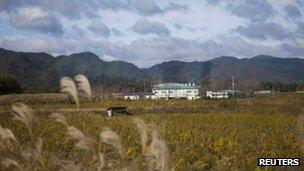Japan bans Fukushima rice shipment due to contamination
- Published

Japan has banned shipments of rice from an area near the nuclear power station at Fukushima after high levels of radioactive caesium were detected.
The sample came from a Fukushima city farm about 60km from the plant.
The Fukushima Daiichi nuclear plant was damaged by the earthquake and tsunami in March, resulting in radiation leaks.
Chief Cabinet Secretary Osamu Fujimura said the material was detected during pre-shipment tests and the contaminated rice had not been sold to consumers.
"I have told the governor of Fukushima prefecture to restrict shipments of rice harvested this year in the Onami district of Fukushima city," said Mr Fujimura.
The sample that was tested contained 630 becquerels per kilogram of radioactive caesium, more than the central government's safety limit of 500 becquerels.
This is the first time that the authorities have imposed a ban on shipments of rice from the area.
There have been a series of scares over radiation in food in Japan in recent months, including beef, mushrooms and green tea.